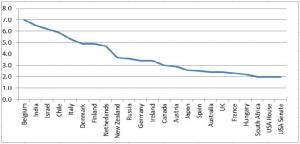RECENT BOOK COMBATIVE CONGRESS LAYS OUT THE NEED FOR A GREATER VARIETY OF IDEAS IN CONGRESS AND HOW TO GET THEM
AUSTIN, TX, UNITED STATES, July 29, 2024 /EINPresswire.com/ -- Combative Congress, Your Power! Your Voice! Amazon https://a.co/d/6SRqb6Q was recently published by Solve American Gridlock LLC https://www.solveamericangridlock.com/. It analyzes why Congress has only 2.0 parties and explains why changes in the electoral systems will open competition to additional parties and a more civil and productive Congress. Other important countries have an average of 3.9 parties.
The book describes how the two parties have created state and federal laws that inhibit new parties and independents from competing successfully for seats in the U.S. House and Senate. This book tells that the result is to block fresh ideas and compromise, paving the way for the party in control of a chamber to avoid serious collaboration. It then cites major problems of our country that need to be solved with more innovation and cooperation.
It uses root cause analysis to determine the reasons for the U.S. being an outlier among key nations in having two parties, arriving at the conclusion that electoral methods are at the heart of the issue; the book continues to identify the changes needed.
Combative Congress advocates electoral systems changes. These are Open, Nonpartisan Primaries using ranked choice voting (RCV) and steps to eliminate gerrymandered districts for the House of Representatives.
Combative Congress describes the closed partisan party primary system as a key barrier to new ideas and innovative policies. It virtually ensures that a candidate from each of the two powerful parties will advance through the primary process – the chute – and that one or the other will be elected in the general election. This has the effect often of returning the same candidates and the same ideas to the halls of Congress each election. In the process, it creates voter apathy, low voter turnout, and in many states, primary winners who did not earn a majority vote.
Another change it develops is instituting Ranked Choice Voting (RCV) in primary elections. RCV, also known as instant runoff voting, is a proportional and nonpartisan voting method. Instead of holding a separate runoff election in the future, voters are given the option to rank candidates in the order of their preference to produce an “instant runoff” result. Voters rank candidates in order of choice. They may rank as many or as few as they please. The winner will always have a majority. Candidates have reason to be more civil and issue-focused due to the possibility of gaining second or third choice votes and thus having a chance to win in a later round of voting.
RCV has been tested and is well accepted. For example, it is used in many U.S. Universities; the Academy Awards Oscars selections; internationally in Australia, New Zealand, Ireland and North Ireland, Scotland, Malta, many European countries; Maine and Alaska. It can be and is used in state and local elections ever more widely in the USA.
Recent events in the presidential race have laid bare the importance of finding the root causes of national friction and dealing with them.
The mission of the book is to be a handbook to the electoral systems used for electing Congresspersons and the changes needed to have more collaboration by facilitating competitive viewpoints and choices among candidates.
Combative Congress addresses a serious and complex topic in ways that make reading it pleasant. This nonpartisan book is unique in that its appeal stretches from a high school student to a professor, from a young woman to a retired chemical engineer, and more. It was written to be concise and readable in less than three hours with some humor; it has 33 color graphs and photographs to implant images of concepts in the reader’s mind; and it has short chapters and good references.
National constitutions have lasted an average of only 17 years since 1789. America’s Constitution has lasted over 230 years! The book points out the need for continued vigilance.
In 2014, about 94% (https://ballotpedia.org/United_States_Congress_elections,_2014) of incumbent congressional candidates were returned to office, but the approval rate for Congress was around 15% (https://news.gallup.com/poll/180113/2014-approval-congress-remains-near-time-low.aspx). How in the world can that be? The answer is that we have broken electoral systems.
Solve American Gridlock LLC’s primary focus is educating citizens about improvements that can be made in the methods used to elect members of Congress.
Tom Mast is the founder of Solve American Gridlock, the author of Combative Congress, and he lives in Austin, Texas. He is a retired engineer with degrees from The University of Texas, Stanford, and the Harvard Business School. He served as a Lieutenant in the U.S. Navy, spent his career in manufacturing and engineering management, and has long been interested in our country’s polarization, the duopoly in our Congress and its causes, and what improvements we must encourage.
“- 30 -“
Tom Mast
Solve American Gridlock LLC
combativecongress@masts.us



